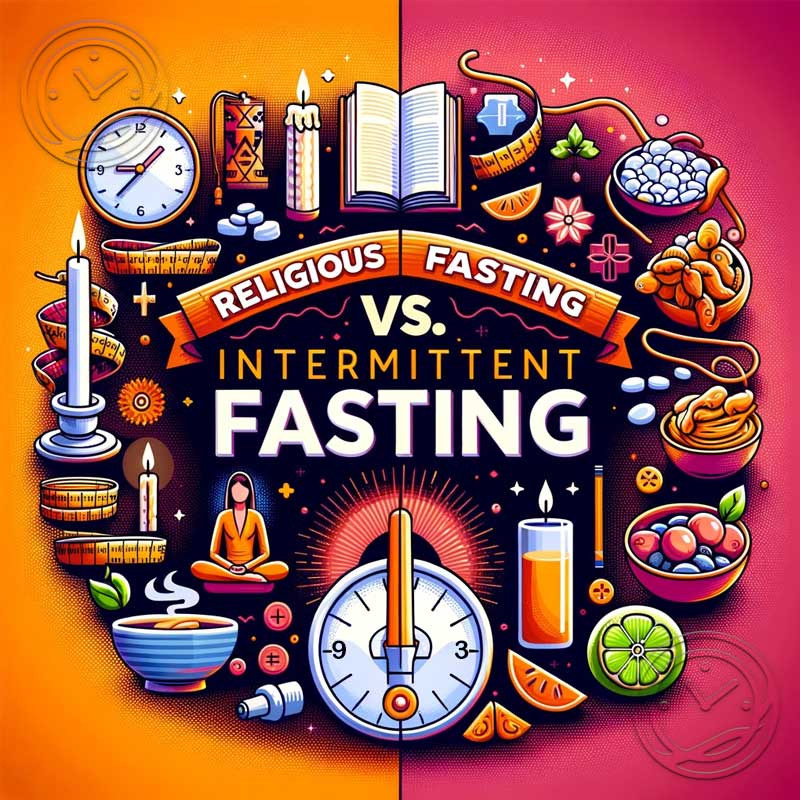Introduction to Fasting Practices
Fasting, a practice deeply ingrained in human history, bridges the gap between cultural, religious, and health disciplines.
It encompasses a spectrum of practices, ranging from spiritual observances in various religions to modern health trends like intermittent fasting.
In religious contexts, fasting is often a symbol of devotion, penitence, or celebration.
For instance, Ramadan in Islam is a time for self-reflection and community, while Lent in Christianity represents a period of renunciation and preparation.
In the health and wellness sphere, intermittent fasting has gained traction, popularized for its effectiveness in weight loss, metabolism boosting, and improvement in blood sugar control.
This diversity in fasting practices reflects its versatile nature, catering to a wide array of personal, spiritual, and health needs.
Religious Fasting vs. Intermittent Fasting
The contrasts and similarities between religious and intermittent fasting are striking.
Religious fasting is predominantly about spiritual purification and adherence to religious doctrines.
It often involves community participation and has a rich cultural significance in festivals and rituals.
Intermittent fasting, on the other hand, is usually a personal health choice, focused on lifestyle changes and physical health benefits.
While religious fasting has historical roots, intermittent fasting is a relatively recent phenomenon, driven by research and a growing interest in nutrition and wellness.
Both, however, share common ground in promoting self-discipline and mindfulness in consumption.
Low-Carb Diet During Breastfeeding
Discover the secrets of maintaining a low-carb diet while breastfeeding. Learn about the benefits and potential risks of low-carb diets…
Spiritual Significance: Beyond Health
In many religions, fasting is more than a mere abstention from food; it’s a journey towards spiritual enlightenment.
In Islam, fasting during Ramadan is one of the Five Pillars, emphasizing self-restraint and closeness to God.
In Judaism, fasts like Yom Kippur focus on atonement and spiritual introspection.
Christianity uses fasting during Lent as a reminder of Jesus’ 40-day fast in the desert.
In Hinduism and Buddhism, fasting is often linked to meditation and spiritual cleansing.
These practices highlight a profound mind-body connection – a holistic approach to well-being that transcends physical health.
Health Benefits: A Shared Goal
Both religious and intermittent fasting offer numerous health benefits.
They promote detoxification, a process where the body eliminates toxins, and autophagy, where cells self-cleanse and regenerate.
These practices aid in weight management and calorie restriction, which can lead to improved cardiovascular health.
Blood sugar control is another significant benefit, with fasting helping to stabilize glucose levels, thus offering a potential benefit in diabetes management.
Additionally, both fasting methods have been linked to reduced inflammation, which is a key factor in many chronic diseases.
These shared health benefits make fasting a versatile tool in health management and prevention strategies.
Are you ready to elevate your cycling game to the next level? The Paleo diet, based on ancient eating habits,…
Fasting Methods Compared
Rules and Restrictions: Dietary Focus
Religious fasting comes with a set of specific dietary rules.
For instance, during Ramadan, Muslims abstain from food and drink from dawn to dusk, while in Judaism, certain fast days involve a complete fast without food or water.
These rules often have symbolic meanings, reinforcing the spiritual intent of the fast.
Conversely, intermittent fasting, such as the 16:8 method or 5:2 diet, focuses primarily on the timing of meals rather than specific dietary restrictions.
The emphasis is on creating a structured eating window, which allows the body to enter a fasting state conducive to weight loss and metabolic improvements.
Low-Carb Diet During Breastfeeding
Discover the secrets of maintaining a low-carb diet while breastfeeding. Learn about the benefits and potential risks of low-carb diets…
Fasting Duration
The duration of fasting varies widely between religious and intermittent fasting.
Religious fasts can range from sunrise to sunset, as in Islam’s Ramadan, to complete 24-hour fasts seen in some Jewish observances.
These durations are often fixed and tied to the lunar calendar or specific religious dates.
Intermittent fasting, in contrast, offers more flexibility, with various schedules accommodating different lifestyles and health goals.
For example, the 16:8 method involves 16 hours of fasting followed by an 8-hour eating window, while the 5:2 approach involves normal eating for five days and calorie restriction for two non-consecutive days.
This flexibility allows individuals to tailor their fasting schedule to their personal needs, making intermittent fasting a versatile option for many.
Fasting for Spiritual Growth and Self-Control
Fasting, in its various forms, is not just a physical act but a profound exercise in spiritual growth and self-control.
In religious contexts, it’s often seen as a means to cleanse the soul and strengthen faith.
For example, during Ramadan, Muslims not only abstain from food and drink but also focus on purifying thoughts and actions, enhancing their spiritual wellbeing.
In intermittent fasting, although the primary goal might be physical health, the discipline required to adhere to fasting schedules fosters a strong sense of self-control and mental resilience.
This discipline can transcend into other areas of life, promoting a holistic approach to health and well-being.
Fasting, therefore, becomes a tool not just for physical transformation, but for personal and spiritual development as well.
Mind-Body Connection
Fasting uniquely bridges the gap between the mind and the body, a concept deeply rooted in many cultural and religious traditions.
This mind-body connection is evident as fasting requires mental strength to overcome physical hunger, reinforcing mental discipline and focus.
In intermittent fasting, this connection is acknowledged through the understanding of how fasting affects the body’s metabolism and brain function.
Fasting can lead to improved cognitive function and emotional well-being, demonstrating the intricate link between our dietary habits, physical health, and mental state.
Adapting Fasting to Individual Needs
One of the key strengths of intermittent fasting is its adaptability to individual lifestyles and health requirements.
Unlike religious fasting, which has fixed timings and rules, intermittent fasting offers various approaches like the 16:8 method, 5:2 plan, or even daily 12-hour fasts, catering to different body types, health goals, and schedules.
This flexibility allows people to incorporate fasting into their lives in a sustainable and effective way, making it a popular choice for those seeking a lifestyle change for better health.
Fasting and Lifestyle
Integrating fasting into one’s lifestyle requires a balance of nutrition, activity, and rest.
Whether it’s intermittent fasting or religious fasting, it’s essential to maintain a diet rich in health foods, ensuring that the body receives all the necessary nutrients during non-fasting periods.
Hydration, sleep quality, and stress management are also key factors that influence the effectiveness and experience of fasting.
Balancing these elements, along with a mindful approach to eating and fasting, contributes to a healthier, more harmonious lifestyle.
Consultation with Healthcare Professionals
Before embarking on any fasting regimen, it’s crucial to consult with healthcare professionals, especially for individuals with preexisting health conditions, the elderly, or those on medication.
Healthcare professionals can provide tailored advice, considering factors like individual metabolism, nutritional needs, and medical history.
This step is vital to ensure that fasting is practiced safely and beneficially, aligning with one’s health goals and conditions.
Conclusion
In conclusion, fasting, whether for religious reasons or health purposes, is a deeply personal journey.
It offers a unique blend of physical, mental, and, in some cases, spiritual benefits.
Understanding the different approaches to fasting, and how they align with personal health goals, lifestyle, and beliefs, is key in choosing the right path.
Remember, the effectiveness of fasting is not just in abstention from food but in the mindful approach towards it and its integration into one’s daily life.
With the right guidance, knowledge, and mindset, fasting can be a transformative practice, leading to improved health, greater self-awareness, and enhanced well-being.






